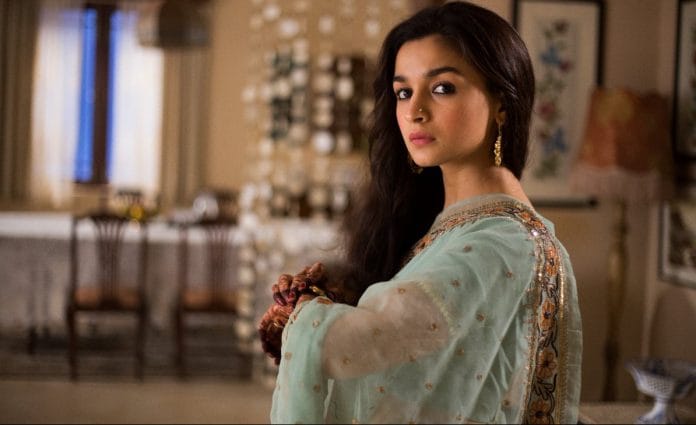The anguish of Raazi’s protagonist resonates with many of us grappling with a mutated, aggressive, and exclusionary Indian identity we never asked for.
Nationalism is an easy sell in India. As a country of combustible tempers, fragile egos, and an acute (yet ignored) understanding of how treacherous the ground we stand on is, we love a validation of the idea of the nation we claim to be.
No nationalism is profitable without an antagonist to underline it, so Pakistan becomes our rather comfortable bogey. It’s very easy to forget how fraught we are internally when we have a common enemy to defeat, especially when we demonise the said enemy enough to forget its inherent humanity.
This sentiment has been echoed across the board, over the years, in the ‘patriotic’ movies Bollywood has made. Whether it was the wide-eyed, screaming jingoism of Sunny Deol’s Major Kuldip Singh in Border, or the wide-eyed, screaming jingoism of Sunny Deol’s Tara Singh in Gadar: Ek Prem Katha, the message has always been simplistic: India good. Pakistan bad.
Two movies surrounding the Kargil war provided an interesting contrast of sorts: The snoozefest that was LoC Kargil allowed unconditional sanctimoniousness to the Indian forces, whereas Preity Zinta offered some perspective in Lakshya as journalist Romila Dutta. Her question was brushed aside, of course, but she did get to ask something we rarely allow ourselves to wonder about: Why?
Meghna Gulzar’s Raazi takes this question and weaves it into the central theme of the movie instead of tacking it to the periphery. The viewer gets no respite from the weight of the question of what motivates patriotism — there is no chest-thumping, no earth-shattering soliloquies, and no vengeance. There is no anchor for a viewer’s own biases to take root.
Raazi marks a definite departure from the recent spate of hyper-nationalist movies that have allowed their protagonists the kind of antagonists we all wish we had — evil, scheming caricatures that leave little room for any kind of empathy. They are portrayed as cruel, inept, and less human than the people we’re supposed to cheer for. Think of movies like The Ghazi Attack, Bajrangi Bhaijaan, Tiger Zinda Hai. Think of the one-dimensional, narrow ideas of right and wrong they offer to their audiences.
Raazi offers no such hatred. It offers no otherworldly heroes, either. Sehmat, fleshed out beautifully by Alia Bhatt, is no born hero. She does not miraculously gain capacities beyond herself, and does not project herself as beyond human. She’s flawed, cripplingly so, with a heart as soft as her work is hard.
The portrayal of Pakistanis merits a special mention. The Pakistani family she is married into could have become an easy motif to be exploited. The idea of ‘cruel in-laws’ isn’t a new one to Indian pop-culture. Gulzar, instead, takes time out to sketch the Syeds as kind, generous folks who are very hard to dislike. The revulsion and hurt Sehmat feels at tearing them apart hits the viewer too — there are no ‘bad’ people in Gulzar’s universe. Just bad, painful circumstances.
When Sehmat is asked by her trainer, Khalid Mir (Jaideep Ahlawat in his best performance to date), why she’s putting herself on the line, she does profess love for her nation, her mulk — but prefaces it with her family’s history of daring patriotism. Her love begins as much as an inheritance as it is a choice. As the movie progresses, it is often too heavy for Sehmat to bear.
As her choice is taken away by her contexts, watching her grapple with the actions she has no control over feels like a metaphor for India today. As so many of us grapple with a mutated, aggressive, and exclusionary Indian identity we never asked for, Sehmat’s struggles feel especially poignant and relevant. Her anguish in the movie’s (admittedly over-the-top) climax is clear when she asks what ends do means as violent as those handed to her have. It tugs because it’s a question we, as an audience, have been lulled away from. We’ve been fed such simplistic narratives that Raazi’s refusal to bow down to them rankles.
It is easy to say “well, that’s what sells. Easy stuff sells”. But Raazi proves this assertion wrong. It has made Rs 39.24 crore at the box office till now with trade pundits projecting it as a definite hit.
It’s also a definite message to film-makers — audiences are approximately as smart as the content you offer to them. Gulzar does not consider her audiences dumb. She treats them as equal intellectual stakeholders in the story, allowing them to draw their own inferences and realisations. This is a risky gambit, and it takes a hand as balanced as hers to do so while retaining the cinematic drama of the movie. But it’s clearly one that pays off.
Will Raazi change the way nationalism is portrayed on screen in India? Probably not. There’s still a massive market for cinema that doesn’t question the status quo, and most importantly, people willing to bankroll this cinema. However, Raazi’s earnest attempts will not go unnoticed. If it makes even a fraction of its viewers pause and question their own motivations, it will have done more than most movies of its genre. Maybe, as we walk out of the halls humming ‘Ae Watan’ without guessing that it’s Gulzar’s tribute to Mohammad Iqbal, Pakistan’s poet laureate, we’ll find a glimpse of our own patriotism — one that is not thrust upon us as a combination of hatred and brainwashing, but one created by us alone.
Harnidh Kaur is a poet and feminist.







Bloody print. U people are anti-national. In Raazi movie paki people are being portrayed as good and Indians as bad. Stupid brainless alia bhat. Lol